Ginza
last update: December 25, 2020
Ginza is a very central area of Tokyo, without a doubt the main luxury shopping district of the city (in second place we find
Omotesando), with numerous internationally renowned department stores, boutiques, restaurants and cafes. It is considered to be one of the most expensive, elegant and luxurious areas in the world.
Things to do and things to see in Ginza
The main thing to do in Ginza is to enjoy its majestic shops and department stores, inside and outside. Many places here have such a luxurious and refined atmosphere and attention to detail that you will feel like a billionaire without being. In the district there is also the main
kabuki theater of Tokyo, several showrooms of Japanese electronics giants, and some photo galleries that can be visited for free.
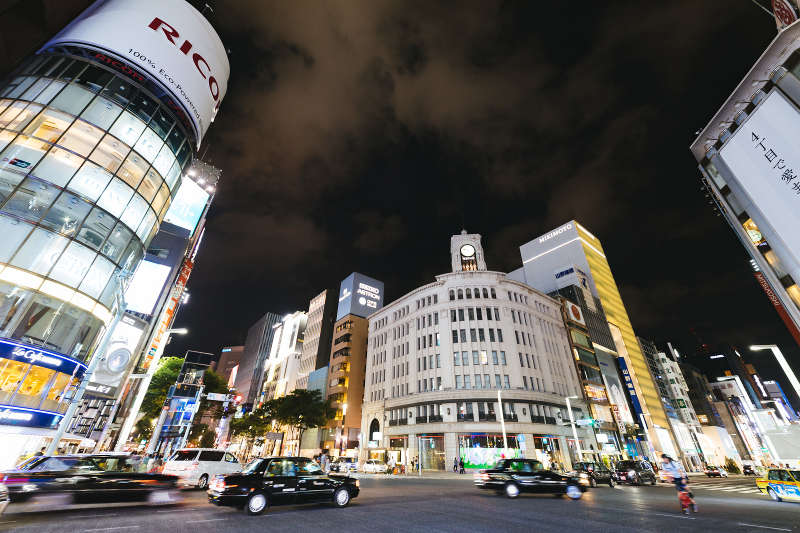 one of the most famous intersections in Tokyo
one of the most famous intersections in Tokyo
Shopping in Ginza
As already widely mentioned, in Ginza there are numerous department stores and shopping centers, as well as single-brand shops of numerous world-famous fashion houses.
The main shopping streets in the neighborhood are
Chuo dori and
Harumi dori, forming one of Tokyo's most famous road intersections (
Ginza 4-chome intersection). In the four corners of this crossroad you will find respectively the department stores of
Ginza Wako and
Mitsukoshi, a circular glazed building with a huge advertisement of
Ricoh on the roof, and the
Ginza Place complex.
On Saturdays, Sundays, and public holidays, a part of Chuo Dori is closed to traffic.
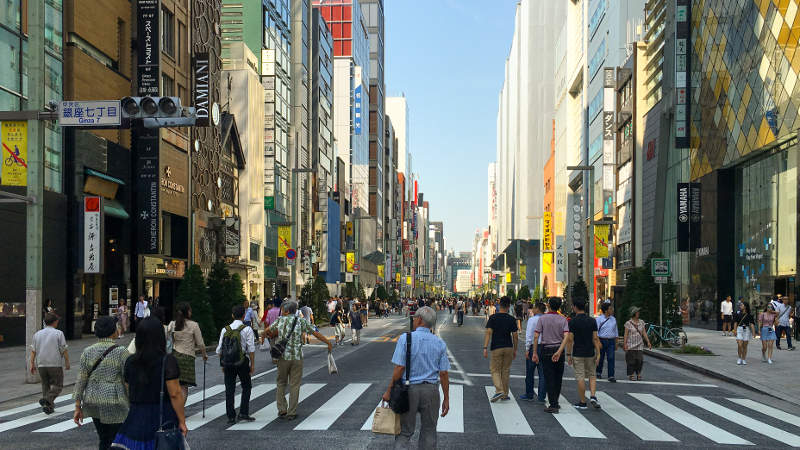 Chuo Dori on weekends
Chuo Dori on weekends
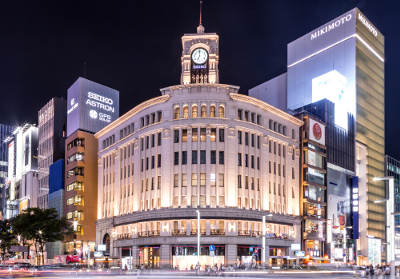
Ginza Wako
Ginza Wako are the most famous department stores in the neighborhood. They are located at the main intersection of Ginza, inside an elegant building in a neoclassical style with art deco influences, inaugurated in 1932 and designed by Jin Watanabe. This building is one of the few in the area to have survived the Second World War. The facade and the clock tower are Ginza's best known landmark. Ginza Wako specializes in imported foreign products, and in particular in watches, jewelry, chocolate, porcelain, tableware and bags. There is also an art gallery on the sixth floor (Wako Hall).
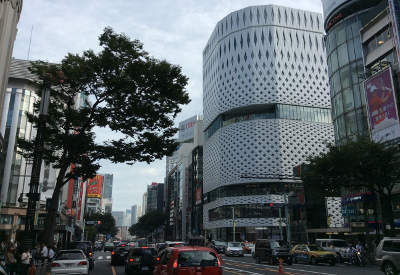
Ginza Place
A modern complex opened in 2016. Inside there is a Nissan showroom on the first two floors (Nissan crossing), a Sony showroom between the fourth and sixth floors with a photographic art gallery (Sony Imaging Gallery), a kimono shop on the first floor (Kimono Tsuzureya) and some restaurants.
Other department stores and shopping centers
Ginza is one of the most amazing shopping districts in Tokyo and around the world. Between historic department stores and new openings in recent years, you are spoiled for choice:
- Marronnier Gate, a huge shopping complex of three separate buildings opposite Yurakucho station. One of the buildings houses the Ginza branch of Tokyu Hands. Another building houses Uniqlo Ginza, which with its 5,000 square meters and 12 floors is the largest Uniqlo store in the world;
- Matsuya, historic chain of department stores in Tokyo, located in Ginza (since 1925) and Asakusa (since 1930);
- Mitsukoshi, historic department stores located right in front of Ginza Wako. The food department in the basement is very famous. However, the largest branch in Tokyo is not this but another one located in Nihonbashi;
- Ginza Six, the largest luxury shopping mall in the neighborhood, opened in 2017, with over 240 shops, 24 restaurants and cafes, a a 480-seat Noh theater in the basement and a large roof garden. The majority of the shops are for luxury cosmetics, design and fashion. There is also a huge Tsutaya bookshop specializing in art publications;
- Tokyu Plaza Ginza, a large shopping center with very sophisticated architecture and an external facade that will surely attract your attention, made of three-dimensional dark glass that creates delicate light reflection effects. In all, there are 14 floors of shops and restaurants, with a roof garden terrace.
Other popular shops
- Itoya, considered the best stationery in Japan. There are several branches in Tokyo, but Ginza is the main one and is housed in a 13-story building. Japanese culture is very tied to paper (think for example of the tradition of origami or the art of shodo). Here you will find greeting cards, origami sheets, pens, pencils, brushes, inks and many other products, excellent as souvenirs;
- Hakuhinkan Toy Park, a large toy store;
- Muji Ginza, the largest store in the world of the famous Japanese brand Muji. In addition to the usual Muji departments, here you will also find a fruit and vegetable department, a bakery, a restaurant, an exhibition space dedicated to furniture design and even a Muji hotel.
Flagship stores with particular architecture
Some big international brands have chosen Ginza to open flagship stores with very sophisticated architecture and often designed by famous architects. In particular, the buildings of:
- Louis Vuitton (by Jun Aoki);
- Hermes (by Renzo Piano);
- Christian Dior (by Kumiko Inui);
- Gucci (by James Carpenter).
- Giorgio Armani (by Massimiliano Fuksas).
- Gap (by Kume Sekkei).
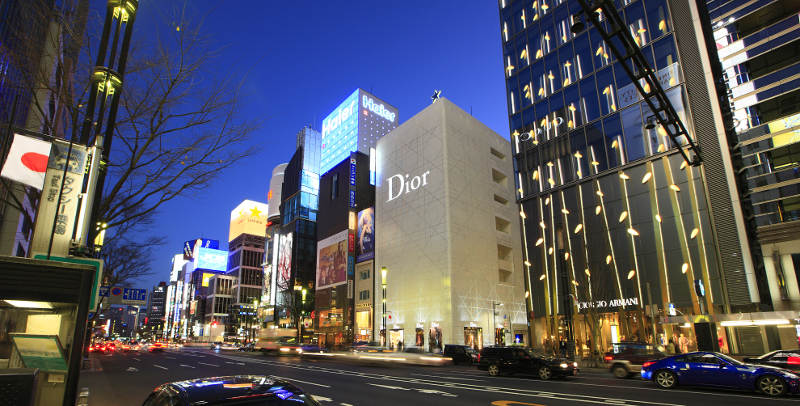 the Armani Ginza Tower and the Dior store in Ginza
the Armani Ginza Tower and the Dior store in Ginza
Other attractions
Kabuki-za Theater
The main stage of the city where to watch a Kabuki theater performance.
The building has a traditional exterior, and is certainly attractive in the eyes of a foreigner, but, beyond this, there aren't any other interesting peculiarities, the old structure was demolished and today's one was rebuilt between 2010 and 2013, and the interior is similar to that of modern cinemas.
How to attend a performance of kabuki at the Kabuki-za Theatre in Tokyo
The Kabuki-za Theatre is probably the best place for a foreigner who wants to attend a Kabuki performance. Everything is designed to facilitate tourists and many of the employees at the theater can speak English. You can find brochures in English about the works you are about to watch, and it is also possible to read the English translation of the show on small monitors placed in front of your seat (further information
here).
At
this link (in English) you can find all the information needed to see the shows, and also buy tickets by registering and paying by credit card. In this case, you'll need to insert the card used for the payment in specific machines on site in order to collect your tickets. If you want to avoid this process and get your tickets directly at the hotel, you can buy tickets
through this service. The rates for a full show range between 4,000 and 21,000 yen (
here the seating chart).
An entire show of Kabuki is divided into several acts, with pauses between an act and the other during which you can also eat, and these shows can last a total of several hours.
There is also the option of attending only one or more acts of a certain show, with discounted tickets.
Buy kabuki tickets at the Kabuki-za Theater online
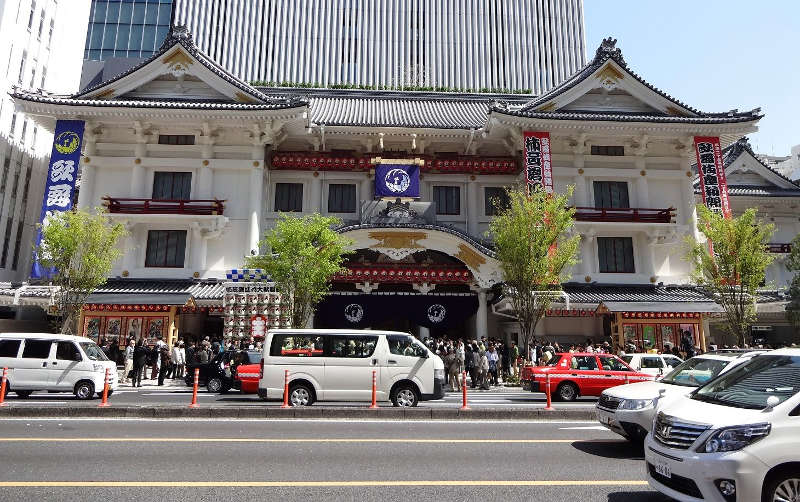 the outside of the Kabuki-za Theater
the outside of the Kabuki-za Theater
Photographic art exhibitions
Everyone knows Ginza as a paradise for fashion and luxury lovers. Actually Ginza is also a paradise for photography lovers, but very few people know this. In fact, in Ginza there are some showrooms of the most famous Japanese photography giants, with all their products, and photographic art exhibitions:
- Nikon Salon (open everyday 10:30-18:30): one of the few Nikon showrooms in Japan is located in Ginza, another one is located in Shinjuku, inside the L Tower. This salon always hosts exhibitions of emerging photographers that can be visited for free. Check out the calendar;
- Canon Plaza (opening hours 10:30-18:30, closed on sundays): something similar to the Nikon Salon, but owned by Canon. Here there is a showroom with Canon products and photographic exhibitions that can be visited for free. Check out the calendar;
- Leica Gallery (opening hours 11-19, closed on sundays): the prestigious German company has about 20 galleries around the world and one of them is located in Ginza, Tokyo. Check out the calendar;
- Shiseido Gallery (open everyday 11-19, 11-18 on sundays): an art gallery with free entry owned by Shiseido, one of the world's largest companies in the production of cosmetics and beauty products. Sometimes it also hosts photographic exhibitions. Check out the calendar.
- Sony Imaging Gallery (open everyday 11-19, 11-18 on sundays): a photographic art gallery located on the sixth floor of the Ginza Place complex. In the same building you will also find a Sony showroom. Check out the calendar.
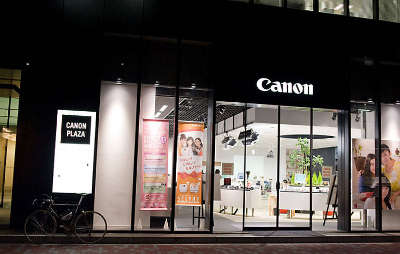
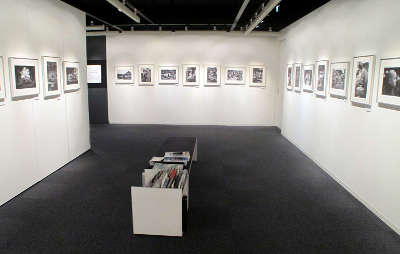 the exterior of the Canon Plaza and the interior of the Nikon Salon in Ginza
the exterior of the Canon Plaza and the interior of the Nikon Salon in Ginza
Sukiyabashi pedestrian scramble
A very busy pedestrian intersection, with people crossing the street in all directions, just like in the legendary Shibuya scramble crossing. The Ginza Crystal curved glass building and the Tokyu Plaza Ginza shopping complex overlook this intersection. From the roof terrace of Tokyu Plaza Ginza you also have a nice view of the intersection from above. Once there was also the Sony Building, a historic building of the neighborhood demolished in 2016. While waiting to build a new building, Sony has inaugurated a small park with underground exhibition spaces (Ginza Sony Park).
Where to stay in Ginza
Pros and cons
Ginza is a very central area of Tokyo, well connected to the rest of the city, full of shops and restaurants, and the spread of English in the neighborhood is above average. It is certainly an excellent starting point for visiting the city. However, after a certain time in the evening, after the shops and offices close, the streets empty quickly. In the heart of Ginza itself there are no hotels, almost all of them are located in the surrounding streets, in particular walking towards Shimbashi (west), Kyobashi (east) or
Tsukiji (south). In terms of prices, the area is one of the most expensive in the city, and there are no particularly cheap accommodations nearby like hostels and capsule hotels.
Affordable recommended hotels in Ginza
In the narrow streets around Ginza there are several business hotels belonging to the most popular Japanese chains. Among the best hotels for value for money, with prices possibly under 10,000¥ per night, we recommend taking a look at:
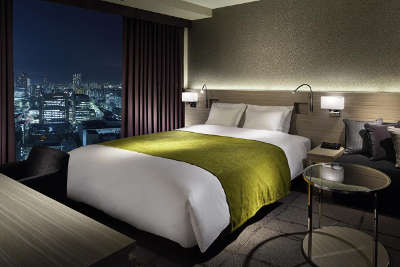 An upscale skyscraper hotel located approximately 600 meters from the main Ginza intersection. All the rooms in this hotel have a panoramic view of the city, but what makes this hotel special compared to many other high-rise hotels in Tokyo is their rooms with a bathtub next to the window, for truly unforgettable nights. When booking on booking.com, to be sure of having a panoramic bathroom, book a Deluxe Twin or a Deluxe Double, or a superior room where the presence of a bathroom with a view is specified.
Price range: double rooms 15,000-20,000 ¥, double rooms with view bath 25,000-30,000 ¥
An upscale skyscraper hotel located approximately 600 meters from the main Ginza intersection. All the rooms in this hotel have a panoramic view of the city, but what makes this hotel special compared to many other high-rise hotels in Tokyo is their rooms with a bathtub next to the window, for truly unforgettable nights. When booking on booking.com, to be sure of having a panoramic bathroom, book a Deluxe Twin or a Deluxe Double, or a superior room where the presence of a bathroom with a view is specified.
Price range: double rooms 15,000-20,000 ¥, double rooms with view bath 25,000-30,000 ¥
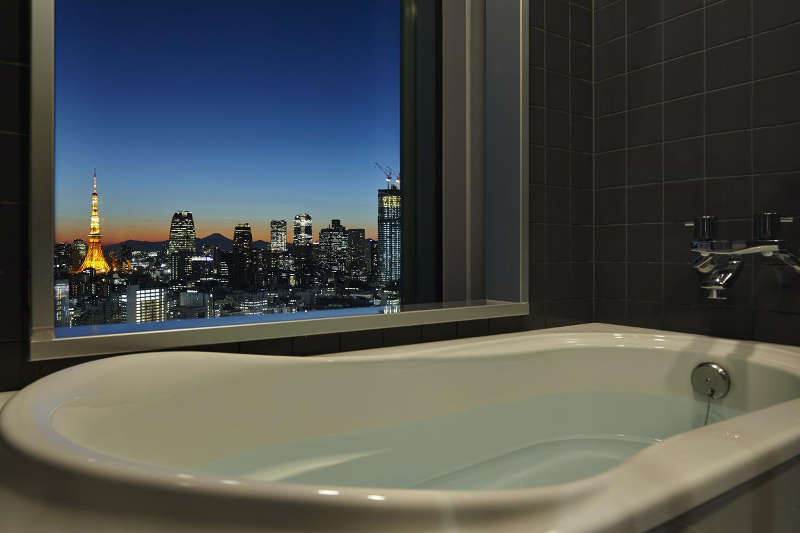 bathtub overlooking Tokyo Tower at Mitsui Garden Ginza Hotel Premier
bathtub overlooking Tokyo Tower at Mitsui Garden Ginza Hotel Premier
Eating in Ginza
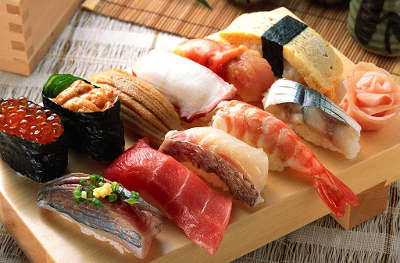
High-end restaurants
In Ginza there are many high-end restaurants, both Japanese and international. Some of the much celebrated Michelin-starred restaurants are located in Ginza. As for
sushi, there is
Sukiyabashi Jiro (here former US president Barack Obama came on his last visit to Japan) and
Sushi Yoshitake. If you're looking for
kaiseki cuisine, there is
Ginza Kojyu, if you're looking for
tempura there is
Tempura Kondo.
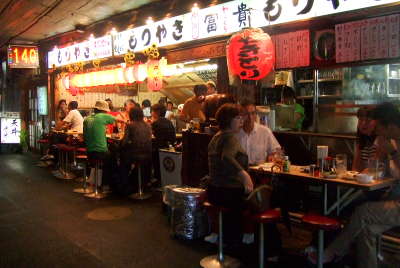
Eat and drink for little money in Yurakucho
Yurakucho is a JR station a stone's throw from Ginza. Under the elevated railway tracks of the JR Yamanote line, near this station, there are several izakaya and small restaurants that are very popular among the thousands of employees who work in the area. They go there for the lunch break but also to eat and drink something in the evening after work with colleagues. The most popular dishes are ramen and yakitori skewers. Prices are very reasonable.
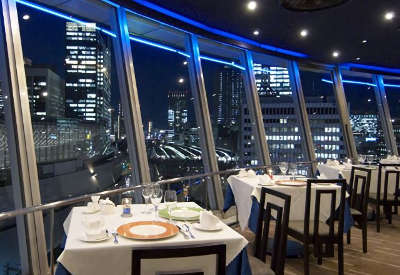
Revolving restaurant Ginza Sky Lounge
There are only two revolving restaurants in Tokyo, and one of them is right in Ginza. The
Ginza Sky Lounge is located on the 15th floor and does the full 360 degree turn in 80 minutes. The restaurant mainly serves Western cuisine for lunch and dinner, tea and cakes in the afternoon. In the evening there is a very romantic atmosphere, accompanied by live piano music.
How to get to Ginza
Ginza is easily accessible from all over the city. In the area there are at least four stations less than 500 meters from each other:
- Ginza station, the most central station in the neighborhood, just below the main streets. It is served by the Ginza line (without changes from Shibuya and Ueno), the Maranouchi line (from Shinjuku and Tokyo station) and the Hibiya line (from Roppongi);
- Yurakucho station, a very useful train station along the JR Yamanote line, and a metro stop along the Yurakucho line;
- Higashi-Ginza station, next to the Kabukiza theater. It is useful if you come from Asakusa, it is served by the Toei Asakusa line;
Getting to Ginza on foot
Ginza can be reached with a pleasant and short walk from the area of
Tokyo Station (1 km) and the
Imperial Palace (1,1 km), but also from
Tsukiji (900 meters) e
Shiodome (1 km). The route between Ginza and Tokyo station is particularly interesting, passing through the area of
Yurakucho, the
Tokyo International Forum and several shopping malls in the area of
Marunouchi.
Map of Ginza, Tokyo
Guided tours, activities and other things to do
If you are planning a trip to Japan and you want to do something more than just visiting famous places and monuments, we suggest you to use
Rakuten Travel Experiences.
How to use Rakuten Travel Experiences
Rakuten Travel is a very useful website to
enrich your travel experience, especially if you are going solo or it's your first time in Japan.
Because of the language barrier (and more), in Japan it is very difficult to interact with the locals and to get off the tourist track.
Thanks to Rakuten Travel you can find a lot of interesting and sometimes unique
guided tours and activities all over Japan (and not only in Japan), that you would otherwise never be able to enjoy.
But there's more: on Rakuten Travel you can also
buy tickets for several famous attractions, events, transportation and other useful services for tourists. Last but not least, you can
reserve a table in hundreds of restaurants.
Some examples
Take a look at Rakuten Travel Experiences
You may also be interested in


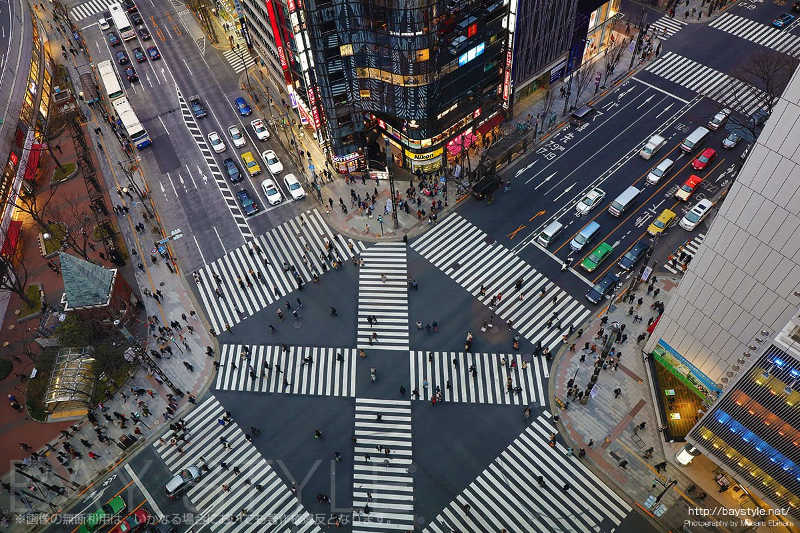 Sukiyabashi crossing (credits)
Sukiyabashi crossing (credits)
 An upscale skyscraper hotel located approximately 600 meters from the main Ginza intersection. All the rooms in this hotel have a panoramic view of the city, but what makes this hotel special compared to many other high-rise hotels in Tokyo is their rooms with a bathtub next to the window, for truly unforgettable nights. When booking on booking.com, to be sure of having a panoramic bathroom, book a Deluxe Twin or a Deluxe Double, or a superior room where the presence of a bathroom with a view is specified.
Price range: double rooms 15,000-20,000 ¥, double rooms with view bath 25,000-30,000 ¥
An upscale skyscraper hotel located approximately 600 meters from the main Ginza intersection. All the rooms in this hotel have a panoramic view of the city, but what makes this hotel special compared to many other high-rise hotels in Tokyo is their rooms with a bathtub next to the window, for truly unforgettable nights. When booking on booking.com, to be sure of having a panoramic bathroom, book a Deluxe Twin or a Deluxe Double, or a superior room where the presence of a bathroom with a view is specified.
Price range: double rooms 15,000-20,000 ¥, double rooms with view bath 25,000-30,000 ¥


